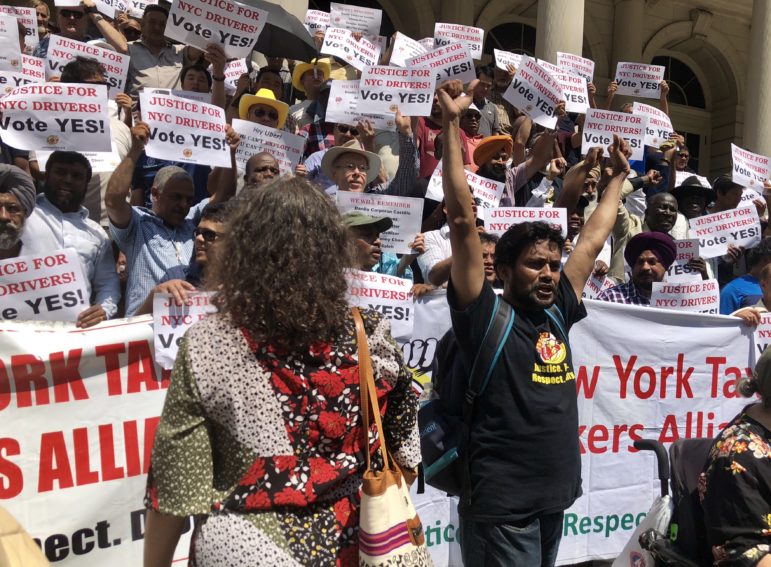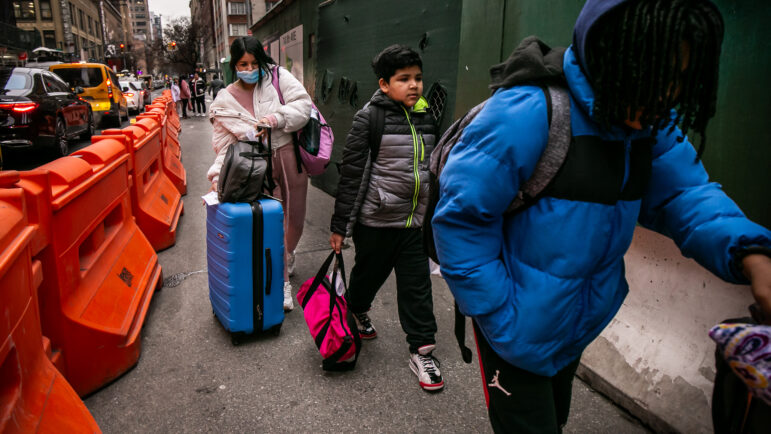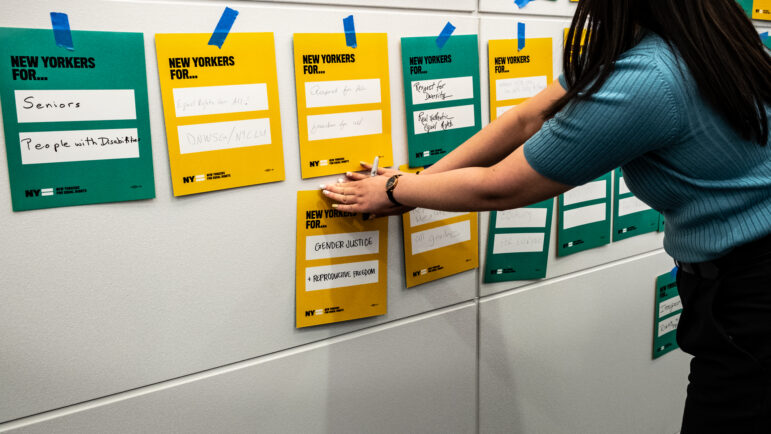
Jeanmarie Evelly
A New York City Taxi Workers Alliance rally outside City Hall before the vote.
The New York City Council passed a package of bills Wednesday to regulate for-hire vehicles (FHV) like Uber and Lyft, temporarily capping most new licenses for such vehicles for one year, and setting a minimum pay rate for drivers.
The move comes as cities across the country grapple with the impact of the rapidly growing, predominantly app-based FHV industry. There were 102,536 licensed FHVs in New York City last year, up from 39,708 in 2011 — unchecked growth that’s contributed to traffic congestion and made it harder for taxi, livery and FHV drivers alike to earn a decent living, officials and advocates say.
In recent months, six drivers working in the industry (two livery drivers, one black car driver and three yellow-cab drivers) have committed suicide, intensifying calls for legislation to address their financial hardships, which many attribute to the ever-rising number of FHVs on city streets.
“This decision, it will travel around the world, because Uber’s around the world, and other cities are questioning what to do,” said George Schifter, whose brother Douglas, a longtime livery car driver, took his own life in February outside City Hall.
“It’s about preventing other men and women from going through the same thing my brother went through,” Schifter told reporters before the City Council voted on the package of bills. “Nobody else should die because they can’t earn a living when they want to, and they’re able.”
The legislation approved Wednesday includes a bill that will put a moratorium on the issuance of new licenses for FHVs for one year, with exceptions for new wheelchair-accessible cars. During that 12 month-period, the city’s Taxi & Limousine Commission will be required to conduct a study on the impact of the FHV industry on the city, and establish rules for regulating it.
“If we continue to let drivers struggle to pay their rent, and we turn a blind eye to growing congestion, we are not doing our jobs as elected officials,” says Councilmember Stephen Levin, the bill’s main sponsor.
City officials first attempted to pass a cap on the number of FHVs in 2015, but the effort was unsuccessful at the time.
Critics of the change — including Uber — argue that limiting the number of FHVs will make it harder for New Yorkers, particularly those of color and those living outside cab-saturated neighborhoods, to get around.
“A cap will not reduce street congestion and is likely to result in increased wait times, higher prices, and significantly reduced reliability outside of Manhattan,” Uber wrote on the company’s blog.
Council members in support of Wednesday’s legislation acknowledged the yellow taxi industry’s bad track record when it comes to serving New Yorkers of color, but say the language of the new legislation specifically gives the TLC power to grant new FHV licenses during the moratorium period if it sees specific areas in need of the service.
The year-long licensing cap also makes an exemption for new wheelchair-accessible FHVs, an effort to increase the availability of taxis for disabled New Yorkers. A lawsuit filed by Disability Rights Advocates against Uber last year alleged that less than one percent of the company’s New York City vehicles have lifts or ramps to accommodate wheelchairs.
The bills passed Wednesday include another that will waive the licensing fees — currently $550 for taxis and $275 for FHVs — if the license is for an accessible vehicle.
“If anyone wants to put a new wheelchair-accessible vehicle on the road, they can do that. In fact, we encourage them to do that,” says City Council Speaker Corey Johnson, who said the new legislation was the result of “careful deliberation” by he and his council colleagues.
“There has not been a real look in this industry to figure out, ‘How do we regulate it in an appropriate way?’” Johnson says.
Other bills approved in the same legislative package include one introduced by Councilmember Brad Lander, which sets a minimum pay rate of $17.22 per hour for FHV drivers, and one that will reduce financial penalties for drivers who perform illegal street-hails.
Mouhamadou Aliyu, who’s worked as a yellow cab driver since 2001, is hopeful the new laws will make things better for the industry. He and other drivers are “getting desperate” because of the increased competition for fares.
“The pie keeps getting smaller,” he says. “It’s getting harder and harder every single day.”









3 thoughts on “City Council Approves 1-Year Cap on New For-Hire Vehicles”
The only result of this legislation will be fewer transportation for outer-borough residents who need to travel to Manhattan or to the airports. Eastern Queens and Staten Island will be hurt the most by the Uber/Lyft caps.
The for-hire vehicle companies spend more time recruiting drivers than they do advertising their services, leading me to suspect that the fees they collect from aspiring drivers is a big part of their income, and why they opposed these limits so angrily.
When the transit-starved are unable to get a ride in a few minutes–keeping in mind that all these “deserts” are already well served by locally owned car service providers–I’ll rethink my support for this cap.
The locally owned car services have improved their fleets only because of Uber/Lyft. The locals don’t have the sophisticated apps that Uber/Lyft is using. A local car service will take me to Manhattan but then he is pretty much stuck with making the long trip back to SI empty whereas an Uber/Lyft vehicle can pick up some fares in the city.